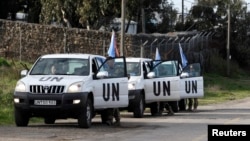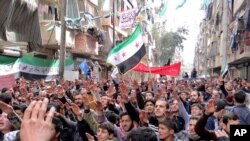UNITED NATIONS —
Efforts to release 21 U.N. peacekeepers held by armed elements of the Syrian opposition were suspended Friday, as darkness made it unsafe for a hoped for release to happen.
Peacekeeping Chief Hervé Ladsous told reporters earlier Friday that there was the possibility of a brief cease-fire Friday to allow for the release of the Philippine observers from the U.N. Disengagement Observer Force, known as UNDOF.
The lightly armed observers were stopped and seized by a group of some 30 armed fighters in the area of separation between Israel and Syria on Wednesday, near the Syrian town of Jamla, which has been subjected to intense shelling by the Syrian army in recent days.
A U.N. peacekeeping spokesperson said arrangements were made with all parties to release the 21 observers. A team from the U.N. mission was sent to the location, but due to the late hour and nightfall it was considered unsafe to continue the operation. The spokesperson said efforts would continue Saturday.
Earlier, peacekeeping chief Ladsous told reporters that the men are safe and being held in four or five different locations in Jamla, as the U.N. worked to secure their release.
“Needless to say, if that were to happen, as we all hope, we would strongly expect that there would not be retaliatory action by the Syrian armed forces over the village and its civilian population after our people have left,” said Ladsous.
Syria’s U.N. ambassador, Bashar Jaafari, disputed the accusation that government forces are shelling the area where the Philippine peacekeepers are being held.
“The shelling is targeting the suburbs of the villages where the armed groups are concentrated. We know for sure what we are doing and we know where the peacekeepers are,” said Jaafari.
There are slightly more than 1,000 U.N. troops in the Golan Heights, where the U.N. has monitored a cease-fire between Israel and Syria since 1974.
Croatia already has announced plans to withdraw its 100 observers from the mission, leaving only Austria, India and the Philippines to staff the force.
Ladsous said the United Nations is looking at how its Golan mission will operate in light of the deteriorating security situation on the ground.
Peacekeeping Chief Hervé Ladsous told reporters earlier Friday that there was the possibility of a brief cease-fire Friday to allow for the release of the Philippine observers from the U.N. Disengagement Observer Force, known as UNDOF.
The lightly armed observers were stopped and seized by a group of some 30 armed fighters in the area of separation between Israel and Syria on Wednesday, near the Syrian town of Jamla, which has been subjected to intense shelling by the Syrian army in recent days.
A U.N. peacekeeping spokesperson said arrangements were made with all parties to release the 21 observers. A team from the U.N. mission was sent to the location, but due to the late hour and nightfall it was considered unsafe to continue the operation. The spokesperson said efforts would continue Saturday.
Earlier, peacekeeping chief Ladsous told reporters that the men are safe and being held in four or five different locations in Jamla, as the U.N. worked to secure their release.
“Needless to say, if that were to happen, as we all hope, we would strongly expect that there would not be retaliatory action by the Syrian armed forces over the village and its civilian population after our people have left,” said Ladsous.
Syria’s U.N. ambassador, Bashar Jaafari, disputed the accusation that government forces are shelling the area where the Philippine peacekeepers are being held.
“The shelling is targeting the suburbs of the villages where the armed groups are concentrated. We know for sure what we are doing and we know where the peacekeepers are,” said Jaafari.
There are slightly more than 1,000 U.N. troops in the Golan Heights, where the U.N. has monitored a cease-fire between Israel and Syria since 1974.
Croatia already has announced plans to withdraw its 100 observers from the mission, leaving only Austria, India and the Philippines to staff the force.
Ladsous said the United Nations is looking at how its Golan mission will operate in light of the deteriorating security situation on the ground.





